- Home
- Anders de la Motte
Rites of Spring Page 18
Rites of Spring Read online
Page 18
INTERVIEWER: Skittish?
LEO RASMUSSEN: Agitated. The least sound spooked him. He’s not fully broken in yet. Something in the forest scared him, an animal maybe. He went crashing straight through a thicket and a branch hit me on the head and knocked me off.
INTERVIEWER: Go on.
LEO RASMUSSEN: I lay there for a while, I think. I don’t know if I passed out, or if it was just the effects of the booze. When I came round Bill was gone. I knew Lasse would be furious, so I spent ages looking for him before I went back to Svartgården. When I got there Bill was back in his stall, so I went to my cabin and got into bed. I was bruised and drunk – I fell asleep right away.
INTERVIEWER: Why didn’t you tell us this from the start?
LEO RASMUSSEN: Because Lasse hates me. Because I knew he’d try and blame all this on me. I thought the less I said, the better.
INTERVIEWER: So if I’ve understood you correctly, you never made it to the stone circle.
LEO RASMUSSEN: No, I didn’t. I never even reached the ford over the canal.
INTERVIEWER: You didn’t see Elita?
LEO RASMUSSEN: No.
INTERVIEWER: And your injuries? How do you explain the scratches on your face and hands?
LEO RASMUSSEN: I got them when Bill was galloping through the trees. It was pitch dark, I couldn’t protect myself.
INTERVIEWER: And you still deny that you murdered Elita?
LEO RASMUSSEN: (INAUDIBLE MUMBLE)
INTERVIEWER: Could you please repeat your answer. Did you murder Elita Svart?
LEO RASMUSSEN: (CLEARS HIS THROAT) No, I didn’t.
Thea takes a break, stretches as she tries to digest what she’s just read. To begin with, Leo had lied about where he’d been on Walpurgis Night. Then, when Lasse suddenly and unexpectedly made a statement dropping him in it, he’d changed his story so that it explained Lasse’s story and his own injuries. It sounded a lot like something he’d come up with after the event. Not a word about a death pact – not yet, anyway.
Emee has started wandering around the room. Thea grabs her jacket and puts the dog on the lead. The corridor outside the surgery is still empty. Maybe the weather is keeping people at home? At least it’s almost stopped raining.
She puts a BACK SOON sign on the door and takes Emee for a walk around the former schoolyard, then crosses the road and enters the churchyard.
The church itself is in darkness, and the wind is whistling through the tall poplars. The rose is still on Elita’s grave, but a few of the petals have fallen off.
There is something about what Thea has just read that is bothering her. Perhaps it’s connected to the fact that she dreamed of her father last night.
Lasse Svart was openly hostile to the police at first, saying virtually nothing, which fits perfectly with his character. Men like Lasse and Thea’s father never talk to the police; it’s part of their DNA. In spite of this, Lasse suddenly changed his mind and became much more talkative. Not only that, he dumped a family member in the shit. Something that should have been unthinkable.
Why did he do that? Why did he break the unwritten rule?
Thea lights a cigarette, remains standing by Elita’s grave as she smokes it.
ELITA SVART 12.02.1970 – 30.04.1986
LOVED. MISSED.
By whom?
Emee moves restlessly, whimpers. Maybe it’s the dog’s reaction that triggers something in Thea, because all at once she feels as if she’s being watched. As if someone is standing behind her, hidden in the gloom between the poplars and the wall, observing her.
She turns her head a fraction, thinks she sees a faint movement out of the corner of her eye, but when she spins around there’s no one there. The only thing that’s moving is the churchyard gate, slowly closing.
45
T
here are still no patients waiting when Thea returns. She unlocks the door, takes down the BACK SOON sign.
Emee pushes past her, stops dead in the middle of the room, ears pricked, sniffing the air.
Thea stops too. The dog is right; there’s something different about the surgery, a faint smell of wet clothes that isn’t coming from Thea.
Her heart rate increases. She checks the drugs cabinet, but it’s locked, and there’s nothing to suggest that anyone has tried to break in. Plus her laptop is still on the desk.
Next to the laptop is the bouquet of flowers with the welcome card from Monday. It was waiting for her when Dr Andersson unlocked the surgery, which means that other people have keys. Maybe all the keys are skeleton keys, like hers?
She sniffs, but any sense of an intruder has been replaced by the smell of wet dog.
Of course it could be Dr Andersson who’d forgotten something, or one of the ladies from the café who came looking for her. However, she can’t quite shake off the feeling of unease from the churchyard, the feeling of being watched.
She sits down at her desk. Elita Svart’s case file is in front of her, closed. Did she leave it like that?
Get a grip, Thea!
She opens the file, turns to the second interview with Elita’s father. She is disappointed to find a summary read out by the interviewer and formally accepted by Lasse Svart, rather than a transcript of the tape recording.
Lasse gave the same information that Thea has already read in Leo’s interview. He got home just after midnight, discovered the Bill and Leo were gone, found the horse in the forest, agitated and covered in mud. He washed the animal down, then went up to the house. Saw Leo limping across the yard at about two.
Lasse’s unexpected talkativeness clearly surprised the interviewer too.
When asked why he had chosen to alter his previous statement, Lasse Svart states that he does not want to see a murderer get away with his crime, and that the man who has killed his little girl must be brought to justice.
The answer sounds entirely logical, yet Thea finds it hard to believe. She tries to imagine her own father in the same situation. What would he have done if she’d been murdered? Certainly not this. He would probably have taken matters into his own hands.
The interview is dated 5 May, which means it took Lasse five days to decide to co-operate with the police. Five days – does that have any significance?
She turns back to the interviews with Leo. The one she read before taking Emee out was held the day after Lasse altered his statement. It is followed by five more in which Leo sticks rigidly to his second version, which is that he fell off the horse and never went to the stone circle.
The next change comes in the ninth and final interview, dated 27 May. By then Leo has been in custody for almost four weeks. Four weeks in a cell. What might that do to a twenty-year-old?
46
27 May 1986
L
eo was woken by the racket from the cell next door, loud yelling followed by a rhythmic banging that passed through metal and concrete, causing a faint vibration in his bunk.
He shook his head, trying to clear his mind. Had he slept, and if so, for how long? Was it night or day? Day, presumably, because his neighbour usually kicked off just before lunch.
He’d requested a move several times, but had been told that the custody suite was full. A lie, along with the lie that the flickering fluorescent tube on the ceiling couldn’t be switched off.
Leo rolled over onto his side, covered his eyes with his forearm.
The sagging waterproof mattress stank of sweat and fear; it was almost impossible to find a comfortable sleeping position. Although sleeping was the wrong word. He hadn’t slept properly for several weeks. The closest he came was a grey fog in which his thoughts metamorphosed into images, faces, voices.
Did you kill her, Leo? Did you kill Elita?
‘No,’ he mumbled, and was shocked by the rasping sound of his own voice.
Elita was dead. It still felt so unreal – like a nasty joke, an absurd nightmare from which he would wake at any moment.
He could see her face in his mind’s eye,
the way she’d looked the second after he’d beaten Lasse at arm wrestling. Her smile, the promises he thought he’d seen in her sparkling eyes. But he’d been mistaken.
You wanted her to run away with you, but she rejected you.
Elita toyed with your emotions. You were angry with her, weren’t you, Leo?
‘No,’ he mumbled again.
He tried to gather his thoughts, repeat the story he’d practised so many times, but it was becoming more and more difficult. The words slithered around, slid away in the fog that filled his head.
Yes, he’d been disappointed.
Yes, he’d drunk more than he usually did because he was upset. Yes, he’d made a stupid decision.
You dressed up as the Green Man, took Bill out, rode into the stone circle. We know that. We’ve matched the hoof prints. You scared the children who were there half to death.
And then, when they’d run away, you were alone with Elita.
He shook his head, tried to silence the voices.
Bill threw him off in the forest. He definitely remembered lying on the ground on his back, looking up at the treetops, a patch of sky, the moon and the stars. He could see them now, as clearly as the flickering fluorescent light.
Bill had thrown him.
But maybe he did that on the way back?
Maybe you were so shocked, so shaken by what you’d done that you lost control of the horse?
Maybe you fell so hard that you don’t remember what happened?
Maybe . . .
‘No!’ He shook his head, tried to blink away the scalding tears.
He hadn’t done it. Hadn’t done it, hadn’t . . .
. . . killed Elita. Are you absolutely certain of that, Leo? Are you sure it wasn’t you?
The images tormented him, disturbed his sleep even more than his crazy neighbour and the flickering light.
Elita on her back on the sacrificial stone. Her hands crossed over her chest, holding the antlers, her face covered with a white handkerchief.
A perpetrator covers his victim’s face because he’s ashamed, Leo. Because he can’t stand to see the victim’s eyes.
The next image was worse.
Elita’s face . . .
Beaten to a pulp. A single, powerful blow with a stone, according to the forensic pathologist. It takes real strength to cause injuries like that. You’re strong, aren’t you, Leo?
He turned over again, covered his eyes with his hands, desperate to escape the blinding light. He needed to talk to someone. His mother. When had he last heard from her? It must be at least a week ago.
No visits, no phone calls, no letters. Not since Elita’s funeral.
Why not?
Because she’s started to have doubts, Leo. Just like you. Not even your mother believes you’re innocent now. We have a witness who saw you bending over Elita on the sacrificial stone.
‘No!’
He buried his face in the paper pillowcase.
The voice grew softer, working its way into his brain.
You loved her, didn’t you, Leo? You’d have done anything for her. She says so herself, in her letter.
Is that what happened? You didn’t do it out of anger, but out of . . .
Love.
Do you love me, Leo?
He sat bolt upright, rubbed his eyes with his fists. His neighbour had fallen silent. When? Impossible to tell. He’d completely lost track of time.
‘Leo would do anything for me. Whatever I ask of him.’ That’s what she wrote in her letter. She wrote that she was going to die, that she’d chosen someone to help her. Is that what happened, Leo?
‘No . . .’
He wrapped his arms around his knees, shook his head.
The image appeared once again, the same image that broke through the grey fog inside his head with increasing frequency. It could be a dream – at least that was what he kept telling himself, but it felt so real.
Elita lying on her back on the sacrificial stone. Eyes open. Looking straight through him.
Do you love me, Leo?
‘Yes,’ he sobbed. ‘Yes, I love you.’ He hid his face between his knees.
I am the spring sacrifice, Elita whispered. All that dies shall be reborn.
She gasped. Her eyes widened. He could see his own reflection in them. One hand was raised above his head. It felt as heavy as a stone.
Do you love me?
Did you kill her, Leo?
Do you love me?
Did you kill her . . .
The bang made him jump. The sound of one of the guards hammering on his door.
‘Up you get, Rasmussen. The police want to question you again.’
47
INTERVIEWER: You said you were never at the stone circle.
LEO RASMUSSEN: That’s correct.
INTERVIEWER: And you’re absolutely sure of that?
LEO RASMUSSEN: Yes.
INTERVIEWER: Just like you’re absolutely sure that you didn’t see Elita.
LEO RASMUSSEN: Yes. Can I ask a question?
INTERVIEWER: What?
LEO RASMUSSEN: My mother hasn’t been to see me for over a week. Not since Elita’s . . . (INAUDIBLE)
INTERVIEWER: Not since Elita’s funeral?
LEO RASMUSSEN: Yes. She used to come every day.
INTERVIEWER: I know.
LEO RASMUSSEN: I’m worried that something might have happened to her.
INTERVIEWER: So she didn’t say anything to you?
LEO RASMUSSEN: About what?
INTERVIEWER: Your family have gone, Leo. Left you in the lurch.
LEO RASMUSSEN: When?
INTERVIEWER: The day after the funeral. One of the guys from the castle called round and the place was empty, the cars gone. No one has seen Lasse, Lola or your mother since then.
LEO RASMUSSEN: That can’t be right. Are you looking for them?
INTERVIEWER: Why would we do that? None of them is suspected of a crime. And you’re an adult – twenty years old, with your own lawyer. You don’t need any help from your mummy, do you?
LEO RASMUSSEN: (INAUDIBLE)
INTERVIEWER: Let’s go back to Walpurgis Night. So you’re absolutely certain that you weren’t at the stone circle, and you didn’t see Elita?
LEO RASMUSSEN: Yes.
INTERVIEWER: The thing is, we’ve found something very close to the spot where the body was discovered. Can you tell me what this is?
LEO RASMUSSEN: It’s . . . It’s my cap badge. From my beret.
INTERVIEWER: ND. Norrland Dragoons. A cavalry regiment originally, I believe. I myself was a coastal ranger. I know how hard you have to work to be awarded your beret and badge. It’s something precious, isn’t it?
LEO RASMUSSEN: Well, yes . . .
INTERVIEWER: So how do you explain the fact that your badge ended up in the forest only twenty-five metres from Elita’s dead body?
LEO RASMUSSEN: I . . . (INAUDIBLE)
INTERVIEWER: Could you repeat that, please?
LEO RASMUSSEN: I can’t explain . . .
INTERVIEWER: ‘Leo would do anything for me. Whatever I ask of him.’ That’s what she wrote in her letter. Is that what happened, Leo? Did Elita want you to kill her? Was that why she was waiting for you in the forest? Was the whole thing actually her idea?
LEO RASMUSSEN: No, no, no!
INTERVIEWER: Elita was manipulative – plenty of people have said so. She was fascinated by death, and wanted to be the spring sacrifice. Did you agree to help her, Leo? Did you pick up a stone and hold it above your head as she lay there on her back in her white dress? Maybe you didn’t intend it to go any further?
LEO RASMUSSEN: No, no . . .
INTERVIEWER: You were angry with her – perhaps that made it easier. She’d rejected you. If you couldn’t have her, then nor could anyone else. Or was it all just a game? Elita liked games, dressing up, acting out little stories. She liked to be the centre of attention. She didn’t want you, di
dn’t want to run away with you, and yet she’d had the nerve to ask you to help her with this stupid charade. You were angry, hurt and drunk. And now she was lying there in front of you, kitted out as the spring sacrifice, asking you to kill her. The woman who’d just turned you down, laughed at your pain. All you had to do was bring the stone down on her face – that would stop her laughing. Maybe you didn’t even do it deliberately. Maybe you just dropped the stone. Maybe the whole thing was just a tragic accident?
LEO RASMUSSEN: (SOBS)
INTERVIEWER: Perhaps your mother can’t stand any more of your lies, Leo. She’s realised what actually happened, and she’s not coming back until you tell the truth.
LEO RASMUSSEN: (CRIES)
INTERVIEWER: I can see you’re suffering, Leo. You’ll feel better as soon as you get it off your chest. Was it an accident, Leo?
LEO RASMUSSEN: I . . . I don’t remember. I fell off the horse. (CRIES) My mother . . .
INTERVIEWER: But you do remember being there? In the stone circle?
LEO RASMUSSEN: M-maybe.
INTERVIEWER: And that you were angry with Elita?
LEO RASMUSSEN: Yes. (CRIES) But I loved her.
INTERVIEWER: So you did it out of love? Could it have been an act of love? Because she asked you to do it?
LEO RASMUSSEN: Maybe. (CRIES)
INTERVIEWER: It’s OK, Leo. You’re doing really well.
LEO RASMUSSEN: (SOBS HELPLESSLY)
INTERVIEWER: So shall we say that you did it out of love?
INTERVIEWER: You’re nodding, Leo, but you have to say it out loud for the tape. Did you kill Elita out of love?
LEO RASMUSSEN: Mm . . .
Thea lets out a long, slow breath. In spite of the dry, typewritten transcript, she can feel the charged atmosphere in the room. The interviewer was manipulative, exploiting Leo’s isolation, his love for Elita, the sense of abandonment he must have felt, knowing that his mother had gone.
She doesn’t know if the police are allowed to do that. Her only experience is what she’s seen on TV crime shows, and it’s nothing like what she’s just read.
She rubs her forehead, feeling overwhelmed by the whole thing. Exhausted. But there is one document she hasn’t yet read, and which interests her. Something she knows a lot more about than police interrogation and crime scene reports.

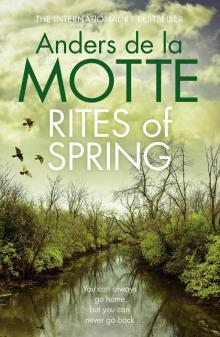 Rites of Spring
Rites of Spring Game: A Thriller
Game: A Thriller End of Summer
End of Summer Buzz: A Thriller
Buzz: A Thriller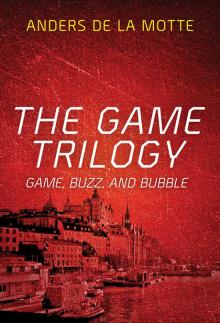 The Game Trilogy
The Game Trilogy Bubble: A Thriller
Bubble: A Thriller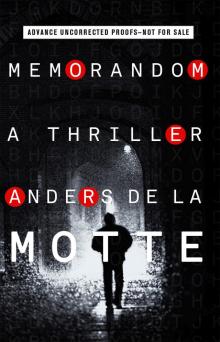 MemoRandom
MemoRandom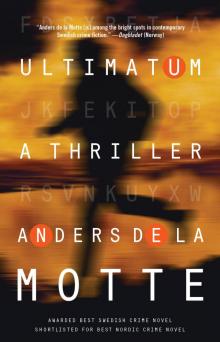 Ultimatum
Ultimatum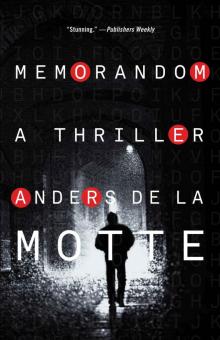 MemoRandom: A Thriller
MemoRandom: A Thriller